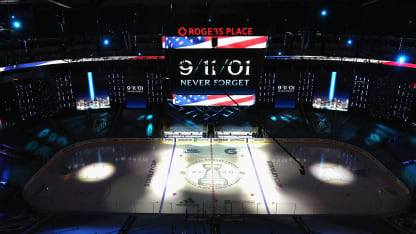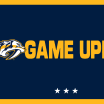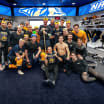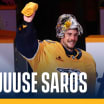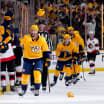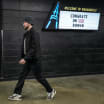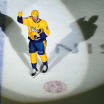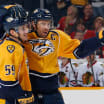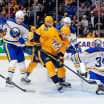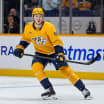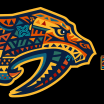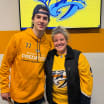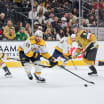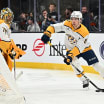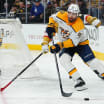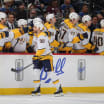It was about 7:45 a.m. locally, and Steve read a wire report that a plane had crashed into one of the World Trade Center's Twin Towers. When I heard that, I was thinking it might have been a light aircraft that had accidentally gone off-course, recalling the story of a bomber that crashed into the Empire State Building in 1945.
Traffic was moving slowly that morning, and 18 minutes later, the next report convinced me that the first collision was no accident. That was when the other (North) tower was hit.
Shaking, within moments I was pulling into the garage at the arena, where players were about to take their preseason fitness tests. The broadcast team was set up to record material for use on the air and for the scoreboard.
At that point in time, it was clear that this was a coordinated attack, like the bombing of Pearl Harbor by Japanese forces in 1941, or the War of 1812 by the British. As the morning moved on, we learned of another plane that crashed into the Pentagon, and yet another that was forced down by a determined group of passengers near Shanksville, Pennsylvania. That flight was evidently aiming for the U.S. Capitol Building.
No American born after the Second World War was familiar with the feelings that were emerging in so many that Tuesday morning.
On the first flight that collided with the World Trade Center were two scouts for the Los Angeles Kings, 53-year-old Garnet "Ace" Bailey and Mark Bavis, 31. Their plan was to fly from Boston to Los Angeles for the opening of Kings' training camp. As a matter of fact, Bavis changed his reservation so that he could be with Bailey. That made an immediate impact on the hockey community.
It was the European players, Czech Republic-born Martin Erat in particular, who immediately grasped the situation. Erat, who had just turned 20, matter-of-factly commented to us: "This is war." Finnish defenseman Kimmo Timonen, then just 25, concurred.
The Predators team that year had a true family feel to it. There were many holdovers from the opening season, including Captain Tom Fitzgerald. Cliff Ronning was the leading scorer, and Denis Arkhipov would score 20 goals that season (on the "Vowel Line" with Vladimir Orszagh and Erat). The defense included Timonen, Karlis Skrastins (who ten years later would be part of another air tragedy with Yaroslav Lokomotiv of the KHL), Andy Delmore, Mark Eaton and Cale Hulse. All were shaken.
Some of us thought about the season-opening trip to Japan the year prior, thinking about what could have gone wrong there.
Clearly, it was another example of a loss of innocence for the country, as it had been in November of 1963, when President Kennedy was assassinated. Most who were alive at the time can remember where they were when they learned of that, or the murders of Martin Luther King and Robert F. Kennedy in 1968.
A group from the Nashville Diocese of Catholic Charities was also affected. They had just returned from a conference in New York. Some of them had gone up to the observation deck at the World Trade Center. Days later, when they received their developed film from that trip, there were pictures of that view. Some of them had to undergo counseling to recover from their close call.
Al-Qaeda clearly had gotten our attention and broke the feeling of invulnerability the United States had developed after World War II. Now, we have the Department of Homeland Security and the Transportation Security Administration. All of those changes came about because of what happened the day the Predators opened their third training camp.
